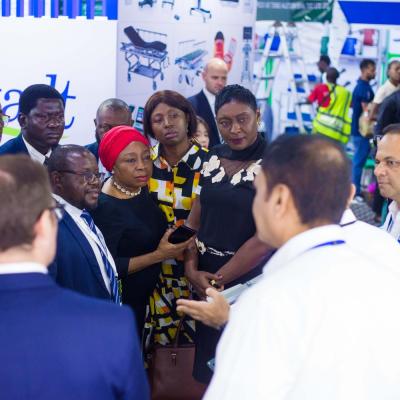Frontpage News (3259)
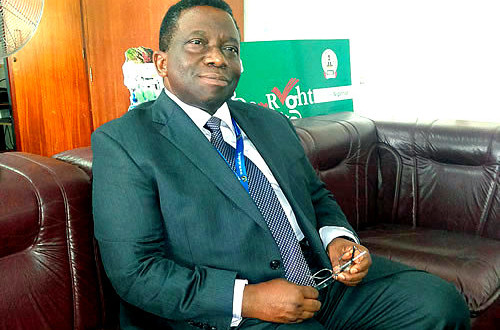 The newly inaugurated minister of health, Professor Isaac Adewole Folorunsho has expressed shock over his appointment to head the ministry while setting a target of reducing medical tourism in Nigeria to at least 20 percent in five years. Adewole stated this in Abuja Wednesday at a grand reception in his honour at the ministry’s headquarters in Abuja adding that as a team, they have set high goals for themselves.
The newly inaugurated minister of health, Professor Isaac Adewole Folorunsho has expressed shock over his appointment to head the ministry while setting a target of reducing medical tourism in Nigeria to at least 20 percent in five years. Adewole stated this in Abuja Wednesday at a grand reception in his honour at the ministry’s headquarters in Abuja adding that as a team, they have set high goals for themselves.
He said “I believe by the end of our first year, we should be able to reduce medical tourism such that in five years time, less than 20 per cent of Nigerians will go abroad for treatment. We will make our teaching hospitals work, and do public-private partnerships so that we can have the healthcare we deserve.” “I’m extremely delighted to be here because for me it is home coming. Even when I must admit that I wasn’t expecting to be posted to health. But being posted to health has a significance, it is like the President saying ‘go back to your terrain and sort things out.”
 Women are twice as likely to die from causes related to pregnancy or childbirth in the United States than in Canada, a new global survey of maternal mortality published by the United Nations and the World Bank showed on Thursday. The United States was also one of only 13 countries to have worse rates of maternal mortality in 2015 than in 1990 – a group that also includes North Korea, Zimbabwe and Venezuela.
Women are twice as likely to die from causes related to pregnancy or childbirth in the United States than in Canada, a new global survey of maternal mortality published by the United Nations and the World Bank showed on Thursday. The United States was also one of only 13 countries to have worse rates of maternal mortality in 2015 than in 1990 – a group that also includes North Korea, Zimbabwe and Venezuela.
The survey, led by the World Health Organization, aims to track progress against the U.N. Millennium Development Goals. It estimated there would be 303,000 maternal deaths globally this year, down from 532,000 in 1990. The U.N. target is to get the global average number of maternal deaths below 70 per 100,000 live births by 2030, with no country averaging worse than 140. The United States and other developed countries are already far ahead of the target, but the U.S. average has slipped from 12 deaths to 14 per 100,000 live births over the past 25 years, while Canada’s is where it was in 1990, at seven.
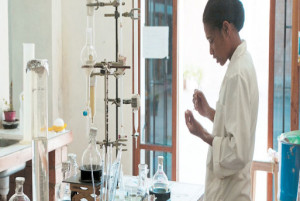 Scientists working in Nigeria have developed a new laser test that can detect malaria in humans within minutes with a simple urine test without drawing blood. Current malaria testing methods requires piecing with a needle to draw blood but the new urine malaria test (UMT), developed by Fyodor Biotechnologies, doesn’t require use of blood. The fast, non-invasive test can detect malaria in both humans and mosquitoes. It has advantages over current techniques because it does not depend on blood sampling, reagents, facilities or trained personnel.
Scientists working in Nigeria have developed a new laser test that can detect malaria in humans within minutes with a simple urine test without drawing blood. Current malaria testing methods requires piecing with a needle to draw blood but the new urine malaria test (UMT), developed by Fyodor Biotechnologies, doesn’t require use of blood. The fast, non-invasive test can detect malaria in both humans and mosquitoes. It has advantages over current techniques because it does not depend on blood sampling, reagents, facilities or trained personnel.
The simplicity – it can be operated by non-medical personnel – and sensitivity of the test mean it could be a low-cost, safe and universal tool for clinical and field diagnoses. Speaking at the launch of UMT in Abuja, Dr Victoria Enwemadu, Fyodor’s global head of projects, said “There are some challenges with adopting that [national malaria testing] guideline mainstream because of the invasiveness of trying to get blood for testing. Now we have made it easier by just using urine to test for malaria.”
 THE Federal Government has said that it is working hard to achieve the Universal Health Care (UHC) in Nigeria by 2020 using ICT to save one Million Lives (SOMLs) in Nigeria. The Permanent Secretary Ministry of Communications Technology, Dr. Tunji Olaopa made the assertion at the preparatory technical meeting to Africa eHealth Summit 2016, held at the Nicon Luxury Hotel, Abuja. Dr. Olaopa, said work was going on so that this goal can be attained on this laudable initiative and make it faster and in a more cost efficient manner.
THE Federal Government has said that it is working hard to achieve the Universal Health Care (UHC) in Nigeria by 2020 using ICT to save one Million Lives (SOMLs) in Nigeria. The Permanent Secretary Ministry of Communications Technology, Dr. Tunji Olaopa made the assertion at the preparatory technical meeting to Africa eHealth Summit 2016, held at the Nicon Luxury Hotel, Abuja. Dr. Olaopa, said work was going on so that this goal can be attained on this laudable initiative and make it faster and in a more cost efficient manner.
“The Government is looking at a situation whereby the strategic part of the effort of the SOMLs initiative and the ministry of health and communication technology will help in the direction of having the UHC in the country in 2020.” Recalled that ministry of health and Communication Technology came together in 2012 with the support of the United Nations Foundation (UNF) to form what was called using ICT to Save One Million Lives (SOMLs),which both ministries have been working hand in hand on and have achieved a lot in that direction.
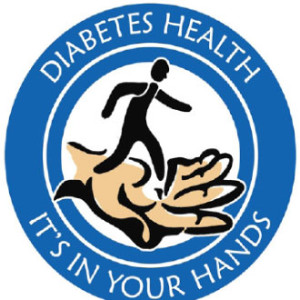 With about 3.8 million people living with diabetes in Nigeria, the International Diabetes Federation (IDF) says Nigerian government will have to subsidise diabetes treatment and remove tariffs on import of anti-diabetic drugs to halt the scourge. Globally, 387 million have diabetes and this is expected to rise to 600 million by 2035 with Nigeria leading the table in the African region according IDF 2015 diabetes figures released yesterday to mark this year’s World Diabetes Day.
With about 3.8 million people living with diabetes in Nigeria, the International Diabetes Federation (IDF) says Nigerian government will have to subsidise diabetes treatment and remove tariffs on import of anti-diabetic drugs to halt the scourge. Globally, 387 million have diabetes and this is expected to rise to 600 million by 2035 with Nigeria leading the table in the African region according IDF 2015 diabetes figures released yesterday to mark this year’s World Diabetes Day.
Speaking at the commemoration event in Abuja Friday, the President, Diabetes Association of Nigeria (DAN) professor Chinenye Sonny said there is no where in the world where diabetic patients pay 100 per cent for their treatment as in Nigeria. “Here, high out of pocket medical expenses drive people into poverty and when we talk about universal health coverage, it means that people should be able to access the care they need without financial hardship,” he said.
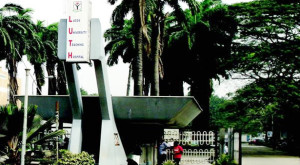 The Nigeria’s National Health Act, (NH Act), 2014 is without doubt one singular instrument required to unlock economy and the greatest transformation for the Health Sector. The act establishes a Basic Health Care Provision Fund (BHCPF) to be financed from Federal Government Annual Grant of not less than one per cent of its Consolidated Revenue Fund; grants by international donor partners and funds from any other source.
The Nigeria’s National Health Act, (NH Act), 2014 is without doubt one singular instrument required to unlock economy and the greatest transformation for the Health Sector. The act establishes a Basic Health Care Provision Fund (BHCPF) to be financed from Federal Government Annual Grant of not less than one per cent of its Consolidated Revenue Fund; grants by international donor partners and funds from any other source.
Out of the fund, the Act states that 50 per cent shall be used for the provision of basic minimum package of health services to citizens, in eligible primary and secondary health care facilities through the National Health Insurance Scheme (NHIS); 20 per cent shall be used to provide essential drugs, vaccines and consumables for eligible primary health care facilities; 15 per cent shall be used for the provision and maintenance of facilities, equipment and transport for eligible primary healthcare facilities; 10 per cent shall be used for the development of Human Resources for primary health care and 5 per cent of the fund shall be used for emergency medical treatment to be administered by a committee appointed by the National Council on Health.
Reducing Environmental Pollution Will Prevent 70, 000 Annual Deaths In Nigeria – WHO
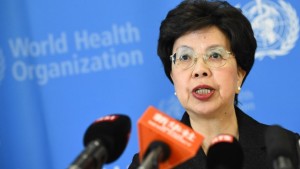 The World Health Organisation (WHO) has adviced that if Nigeria put measures to reduce climate pollutants, it could prevent 70 000 premature deaths per year from outdoor air pollution, from 2030 onwards. According to WHO estimates, climate change is already causing tens of thousands of deaths every year – from shifting patterns of disease, from extreme weather events, such as heat-waves and floods, and from the degradation of air quality, food and water supplies, and sanitation.
The World Health Organisation (WHO) has adviced that if Nigeria put measures to reduce climate pollutants, it could prevent 70 000 premature deaths per year from outdoor air pollution, from 2030 onwards. According to WHO estimates, climate change is already causing tens of thousands of deaths every year – from shifting patterns of disease, from extreme weather events, such as heat-waves and floods, and from the degradation of air quality, food and water supplies, and sanitation.
“The upcoming United Nations Climate Change Conference (COP-21) in Paris offers the world an important opportunity to not only reach a strong international climate agreement, but also to protect the health of current and future generations,” the WHO said in a statement on Wednesday. In 2012, WHO estimated 7 million people died from air pollution-related diseases, making it the world’s largest single environmental health risk. It is predicted that climate change will cause an additional 250 000 deaths per year from malaria, diarrhoea, heat stress and under-nutrition between 2030 and 2050. Children, women and the poor in lower income countries will be the most vulnerable and most affected, widening health gaps.
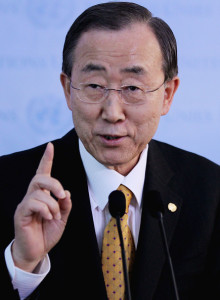 Some 2.4 billion people around the world don’t have access to decent sanitation and more than a billion are forced to defecate in the open, risking disease and other dangers, according to the United Nations. Launching its World Toilet Day campaign for November 19, the UN said poor sanitation increases the risk of illness and malnutrition, especially for children, and called for women and girls in particular to be offered safe, clean facilities.
Some 2.4 billion people around the world don’t have access to decent sanitation and more than a billion are forced to defecate in the open, risking disease and other dangers, according to the United Nations. Launching its World Toilet Day campaign for November 19, the UN said poor sanitation increases the risk of illness and malnutrition, especially for children, and called for women and girls in particular to be offered safe, clean facilities.
“One out of three women around the world lack access to safe toilets,” U.N. Secretary General Ban Ki-moon said in a statement. “As a result they face disease, shame and potential violence when they seek a place to defecate.” Even where there are toilets in some places around the world, some are hardly suitable to be called toilets.
Global CEO Rakesh Kapoor promises to further intensify diarrhea and malaria prevention efforts in Nigeria
 The Global Chief Executive Officer of the world’s leading consumer health and hygiene company Reckitt Benckiser(RB), Mr. Rakesh Kapoor said that RB’s vision for Nigeria is where people are healthier and live better and RB will continue on making difference by giving Nigerians innovative solutions for healthier lives and happier homes Mr. Kapoor who is on a working visit to Nigeria said this in Lagos during a visit to the Governor of Lagos State, Akinwunmi Ambode. He said RB has been in Nigeria for over five decades adding that he is very happy with the operations of the company in Nigeria which he described as one of the most important growth markets and the reference point for other African business development growth strategies
The Global Chief Executive Officer of the world’s leading consumer health and hygiene company Reckitt Benckiser(RB), Mr. Rakesh Kapoor said that RB’s vision for Nigeria is where people are healthier and live better and RB will continue on making difference by giving Nigerians innovative solutions for healthier lives and happier homes Mr. Kapoor who is on a working visit to Nigeria said this in Lagos during a visit to the Governor of Lagos State, Akinwunmi Ambode. He said RB has been in Nigeria for over five decades adding that he is very happy with the operations of the company in Nigeria which he described as one of the most important growth markets and the reference point for other African business development growth strategies
“RB's heritage in Nigeria spans over 53 years with health, hygiene and home portfolio led by global brands like Dettol, Nurofen, Strepsils, Gaviscon, Durex, Dettol, Harpic, Mortein, and Air Wick. Nigeria also serves as the West African hub driving business development, opening up new markets and portfolio expansion across the West African Coast” he said. Kapoor went on to disclose to the Governor how RB through its power brands Dettol, Mortein and Harpic have been partnering with the Federal and Lagos State Ministry of Health, Nigerian Medical Association and Save the Children NGO on programs to create awareness on best hygiene practices.
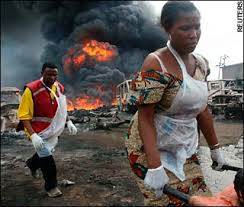 Hospital officials in Adamawa have lauded public response to the call to donate blood to victims of Tuesday night blast in Yola. The Chief Medical Director of Yola Specialist Hospital, Dr Bala Sa’id and the Public Relations Officer of Federal Medical Centre Yola, Malam Adamu Dodo, made the commendation in separate interviews with the News Agency of Nigeria (NAN) in Yola. Said said "the turnout was huge; we received many people who turned out to donate blood for the victims.’’
Hospital officials in Adamawa have lauded public response to the call to donate blood to victims of Tuesday night blast in Yola. The Chief Medical Director of Yola Specialist Hospital, Dr Bala Sa’id and the Public Relations Officer of Federal Medical Centre Yola, Malam Adamu Dodo, made the commendation in separate interviews with the News Agency of Nigeria (NAN) in Yola. Said said "the turnout was huge; we received many people who turned out to donate blood for the victims.’’
He dismissed speculations that some patients were made to purchase drugs, adding that "treatment is free". "Apart from the state government, we also got support from the Victim Support Fund to ensure free treatment of victims.’’ He said many out of the 30 people on admission had received treatment and now discharged. "Many have been discharged; I can’t give you the exact number of the people discharged now because I was not the doctor that went round to effect the discharge,’’ he added.
More...
 The Nasarawa State House of Assembly (NSHA) has warned health practitioners in the state to desist from quackery and other illegal activities or face the full wrath of the law. Deputy Speaker of the House, Mr.Godiya Akwashiki (PDP-Nasarawa Eggon West), gave the warning after the House discussed extensively, a motion brought under matter of public interest by Mr. Mohammed Okpoku (APC-Udege/Loko). Okpoku drew the attention of the House to the illegal activities of some health workers in the state and called on lawmakers to support the bid to flush out quack medical personnels across the state.
The Nasarawa State House of Assembly (NSHA) has warned health practitioners in the state to desist from quackery and other illegal activities or face the full wrath of the law. Deputy Speaker of the House, Mr.Godiya Akwashiki (PDP-Nasarawa Eggon West), gave the warning after the House discussed extensively, a motion brought under matter of public interest by Mr. Mohammed Okpoku (APC-Udege/Loko). Okpoku drew the attention of the House to the illegal activities of some health workers in the state and called on lawmakers to support the bid to flush out quack medical personnels across the state.
He also called on the lawmakers to support the motion to enable the House to in collaboration with the state ministry of health, embark on inspection tour of health facilities across the state. “The inspection tour will help to ascertain the number of registered and unregistered clinics as well as health personnel in order to tackle quackery in the health sector in the state. “My call has become imperative due to the increasing rate of quackery in the health sector in the state which has affected the health needs of my constituency and the people of the state negatively,” he said.
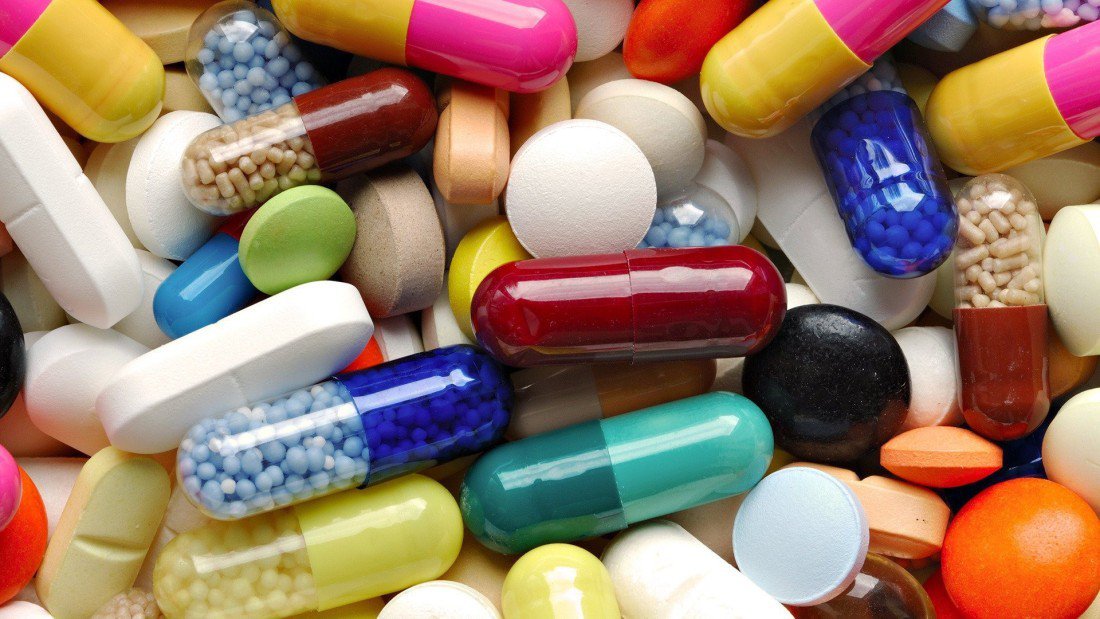 The Federal Capital Territory Pharmaceutical Inspection Committee (FCT-PIC) has sealed off 13 illegal patent medicine shops in Durumi, Lugbe, Gwarinpa, Kubwa and Gwagwa areas of the FCT. The shops were sealed off by members of the six-member committee along with other pharmaceutical inspectors, during its recent enforcement activity. Director of Pharmaceutical Services Department of the FCTA and chairperson of the committee, Pharm. Hauwa Kulu Ibrahim, who led the team, explained that some of the facilities were sealed because they were not registered with the Pharmacists Council of Nigeria (PCN).
The Federal Capital Territory Pharmaceutical Inspection Committee (FCT-PIC) has sealed off 13 illegal patent medicine shops in Durumi, Lugbe, Gwarinpa, Kubwa and Gwagwa areas of the FCT. The shops were sealed off by members of the six-member committee along with other pharmaceutical inspectors, during its recent enforcement activity. Director of Pharmaceutical Services Department of the FCTA and chairperson of the committee, Pharm. Hauwa Kulu Ibrahim, who led the team, explained that some of the facilities were sealed because they were not registered with the Pharmacists Council of Nigeria (PCN).
Others, according to her, were sealed for selling prescription only medicines and evidence of administering injections, refusal to relocate from market area, poor storage conditions of drugs and poor sanitary conditions of shops and surroundings. Ibrahim said that intending patent medicine vendors are required by regulation to apply for inspection, obtain approval for registration and conclude
‘Emergency Transport Service Helped Save 19,000 Pregnant Northern Women’
 An Emergency Transport Scheme piloted in four northern states by Health Partners International has helped to transport 19,000 pregnant women in the north to health facilities in emergency situations since 2009. The project with funding from the MacArthur Foundation is implemented in states of Jigawa, Katsina, Yobe and Zamfara but begs for a nationwide implementation. Findings show that 1,592 communities were reached with a population coverage of 4.3 million.
An Emergency Transport Scheme piloted in four northern states by Health Partners International has helped to transport 19,000 pregnant women in the north to health facilities in emergency situations since 2009. The project with funding from the MacArthur Foundation is implemented in states of Jigawa, Katsina, Yobe and Zamfara but begs for a nationwide implementation. Findings show that 1,592 communities were reached with a population coverage of 4.3 million.
At a assessment workshop Friday in Abuja, a senior partner of the project, Emmanuel Sokpo said the scheme was designed to help ensure the transportation of women in rural areas and to ensure they have access to health care facilities on time. “This was a pilot study to see the effects of various modes of incentives to drivers in carrying out this service, whether it should be cash or social incentives like recognition of people by the community, giving them shirts or fixing their vehicles when bad,” Sokpo said.
 The Jigawa Government on Saturday said it targeted 1,298,198 children for immunisation against measles across the state. The State Immunsation Officer, Alhaji Hassan Kwalamdisclosed this at the launch of the 2015 measles campaign at Kyarama Village in Ringim Local Government Area of the state. Kwalam explained that the total of 1,440 designated vaccination centres would be used for the five-day exercise. According to him, the team of vaccinators in each centre will move from one village to another, to ensure that all children in the state are immunised. He urged parents and caregivers in the state to make best use of the exercise and ensure that their children and wards were vaccinated.
The Jigawa Government on Saturday said it targeted 1,298,198 children for immunisation against measles across the state. The State Immunsation Officer, Alhaji Hassan Kwalamdisclosed this at the launch of the 2015 measles campaign at Kyarama Village in Ringim Local Government Area of the state. Kwalam explained that the total of 1,440 designated vaccination centres would be used for the five-day exercise. According to him, the team of vaccinators in each centre will move from one village to another, to ensure that all children in the state are immunised. He urged parents and caregivers in the state to make best use of the exercise and ensure that their children and wards were vaccinated.
The Immunisation Officer said that after the five-day exercise, the vaccines would be made available in hospitals across the state for the continuous immunisation of children. He said that adequate vaccines were provided to meet the targeted number of children across the state. Kwalam thanked the United Nations Children Fund (UNICEF), National Primary Health Care Development Agency and other international donors for their support to the exercise. In his remarks, the State Commissioner for Health, Dr Abba Zakari, enjoined parents to ensure their children within the age limit were vaccinated.


